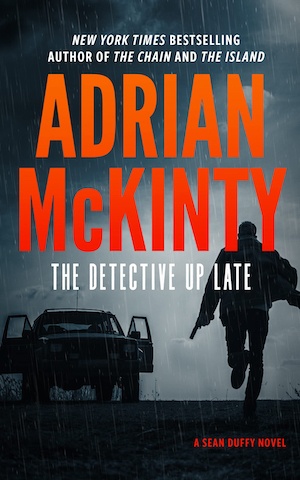
It’s been nearly 12 years since we reviewed The Cold Cold Ground, the first novel in Adrian McKinty’s Sean Duffy series. For reasons that baffle us, books like Rain Dogs, Gun Street Girl and I Hear the Sirens in the Street have been successful with critics like ourselves, but have struggled in the publishing world. To us, the idea of Duffy, a Latin-spouting Catholic detective serving in the Royal Ulster Constabulary during the Troubles, sounds perfect. To publishing directors, maybe it sounds like a road to being cancelled. Hence, it has taken nearly seven years for McKinty’s latest Duffy novel, The Detective Up Late, to finally see the light of day.
If you’re a Tom Waits fan, you may already have noticed the theme going on with the titles of these novels, and perhaps the atmosphere is similar the songwriter’s output. The conflicts Duffy gets caught up in haven’t been and won’t be resolved. Between Belfast and Carrickfergus, it seems like rain is always pelting the window and whiskey frequently pelts the back of Duffy’s throat. That, and the vodka gimlets with spliffs which are motifs in the series.
This time, Duffy and his fellow detectives McCrabban – AKA The Crabman – and Lawson are investigating the disappearance of a 15-year-old traveller girl called Kat McAtamney. The obvious answer is that Kat has run off, tired of cleaning for her mother and siblings in the crowded confines of the trailer park. However, they also learn that Kat was working as an escort and four suspects emerge – a photographer who may have pimped for her, a former UDF enforcer, a lecturer in architecture and a high-ranking civil servant in the Northern Ireland Office.
Each had motive and opportunity. Each has an excuse for dating a 15-year-old. Each has a very different angle on life, which makes the investigation and dialogue very interesting.
Duffy is convinced she’s been murdered, and even though no body has been found, certain discoveries lead to McCrabban and Lawson sharing the opinion of their detective inspector. This is meant to be Duffy’s last case. He and McCrabban are both set to go part-time and do admin seven days a month until their pensions come up in a few years. However, neither is the sort to let a murder case fizzle out through lack of evidence. They work it hard, and then they work it harder still, McKinty’s police procedural creds showing through alongside Duffy’s interviewing tactics, which often cross the line.
What they manage to do is poke a hornets nest and soon all sorts of things are going on, with rural police searching the banks of the Bann in Ballymena, a full-on battle with machine guns, a kneecapping described in gruesome detail, lots of lawyering up and Duffy self-medicating now and again to avoid losing his marbles.
His life is changing and this feels like it could be the final Sean Duffy novel. Already, his partner and young daughter have moved across the ‘seugh’ to Scotland but Duffy is staying in the house where they were nearly killed in the previous book, while occasionally dashing back to see them via the ferry. He’ll move there full time when the case is finished… if that ever happens. With the prospect of retirement ahead, our man has started telling dad jokes, stopped sleeping with witnesses and you’ll see he’s mellowed in other ways too. There’s more Haydn and less pop music on his stereo. But, even though this is 1990 and the IRA threat has diminished a little, he still checks for a mercury switch every time he gets into his BMW.
The Detective Up Late puts us in Duffy’s company once again, which is great, but it lacks the intensity, and perhaps the depth, of previous novels in the series. Even halfway through the novel you’ll still find yourself wondering whether the victim is actually dead. In earlier books, McKinty managed to work real historical events – involving Northern Ireland, the UK and the rest of the world – into the narrative, with Duffy coming into contact with MI5 and so forth. The latter is still happening, however this book misses that wider perspective which, although a bit of a stretch sometimes, has always been clever and interesting.
However, by writing about the victim’s family and Ireland’s traveller community, McKinty does give us a window into something new. Kat’s family has connections to travellers across Ireland and in France and Spain – a Celtic network, almost, that gives the case another dimension. We see the importance of some of Ireland’s ancient, pre-Christian sites to the traveller people and it reminded me a little of how he worked a tiny bit of Irish myth and legend into his previous novel, The Island, set in Australia.
The book’s first chapter, entitled Prelude in E-flat Major, did make me wonder whether a Duffy origin story might be on the way.
Blackstone Pubishing
Print
£22.99
CFL Rating: 4 Stars











I can’t remember where, but I read where Mr. Mckinty was informed his Duffy books would sell better in America if he changed the location of his novel’s settings. Hard to believe all this nonsense that goes on in the publishing world. Also, he has one of the most interesting writing careers and a history that needs to be told more often, including the importance of Don Winslow’s impact upon his writing career.
Wonderful review, thanks for the heads up on McKinty’s latest. It crept under my radar but I am a staunch fan of his earlier works and will definitely read this one if only to catch up on Duffy after all these years 🙂 G.